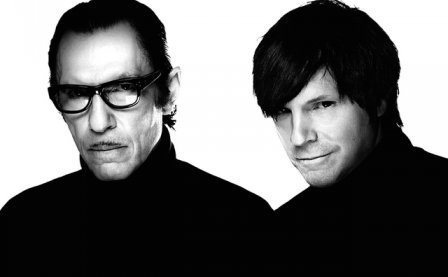My first introduction to Sparks was the song “Tryouts for the Human Race,” a staple and highlight of the dance nights that proliferated in the mid 2000s (though it was written in the late-70s), luring the kids away from their crossed-arm posts at standard indie rock shows. “Tryouts” was a nightly inevitability that I would drunkenly request anyway: its slow-building, operatic electronica was the aural synonym for the superficial grandeur of a coke buzz, while the vocals and instrumentation were suffused with a cheeky braininess that seemed to mock everyone involved. This ambivalence typified my own mixed feelings towards the extroverted twist my musico-social life had taken.
I was probably projecting a bit. Unbeknownst to me at the time, the Giorgio Moroder-produced “Tryouts for the Human Race” is sung from the point of view of unreleased spermatozoa. Sample lyric: “When that love explosion comes, my, oh my, we want to be someone.” Which is as good an illustration as any for explaining why, despite brushes with the mainstream over the past four decades, Sparks remain a cult band. The duo, Angelenos Ron and Russell Mael, approach songwriting with a serious commitment to silliness, and they exhibit a wryly suggestive humor that feels peculiarly British. Indeed, the brothers are self-professed Anglophiles who recently came off of a 21-night “Sparks Spectacular” in London, where they played one of their studio albums each night in chronological succession. Their residency was capped by a performance of their new record, Exotic Creatures of the Deep. Their crowning achievement? There is certainly a case to be made for it.
The album is book-ended by a layered, polyphonic harmony that features multiple Russells cooing “I don’t care if you love me/ Just so you like me.” Is this a plea for critical recognition after so many years of unrecognized innovation? In between, we get a monkey chauffeur (“Let the Monkey Drive”), a Mozz-obsessed girlfriend with unfair expectations of her lover (“Lighten up Morrissey”), and, err, a male pregnancy (“She got me Pregnant”). The frustratingly murky term chamber pop has been employed to describe the Sparks sound since 2002’s Lil’ Beethoven, which marked their return to relevancy after a long period of artistic dormancy. Exotic Creatures is the third in the “new Sparks” trilogy and is best befitted to that vague label: it foregoes much of the electronic and classical experimentalism of the last two records in favor of traditional-ish pop structures and theatrical dynamics, landing the band in the divide between show tunes and The Flaming Lips. The brothers cheekily acknowledge their separation from all things hip on “This is the Renaissance.” “Contrapuntal music is the music that your parents fear” Russell sings (the Mael bros, like the Gallaghers, strictly split singing and lyric duties) over a descending rock riff that develops into a booming madrigal. The titular line “THIS IS THE RENAISSANCE” (“or is it Renåissance?”) is conveyed with a conviction, however, that suggests the brothers are doing more than just playing a part.
Like with The Village Green Preservation Society or Tommy, each song is a mini-opera within a larger one. Less transparently conceptual than either of those records, Exotic Creatures nevertheless runs sort of like the musical tragicomedy of, well, Sparks. They dabble in enough meta-whatever to encourage this interpretation. Containing lines like “But the song lacks a heart, comes off overly smart/ An emotional core, ain’t that what songs are for?,” “Strange Animal” see-saws between jittery piano and fast, heavy guitars. The record finishes with ”Likable,” where the narrator bares his badge of likability with reservation and wonders what it would feel like to inspire more intense affection.
Whether Exotic Creatures arouses new love for this strange animal of a band depends largely upon how the listener feels about its pop burlesque. Some “serious” music fans will have trouble tolerating the Jarvis Cocker-goes-Weird Al sensibility that accompanies the irrefutably imaginative arrangements. As behind the parodic surface of Spinal Tap lurked the heart of rock ‘n’ roll true believers, so it is that behind Sparks lurks two men sincerely interested in exploring the power of pop music. Will they ever get the love they deserve for their troubles? Maybe only in the UK.
More about: Sparks




